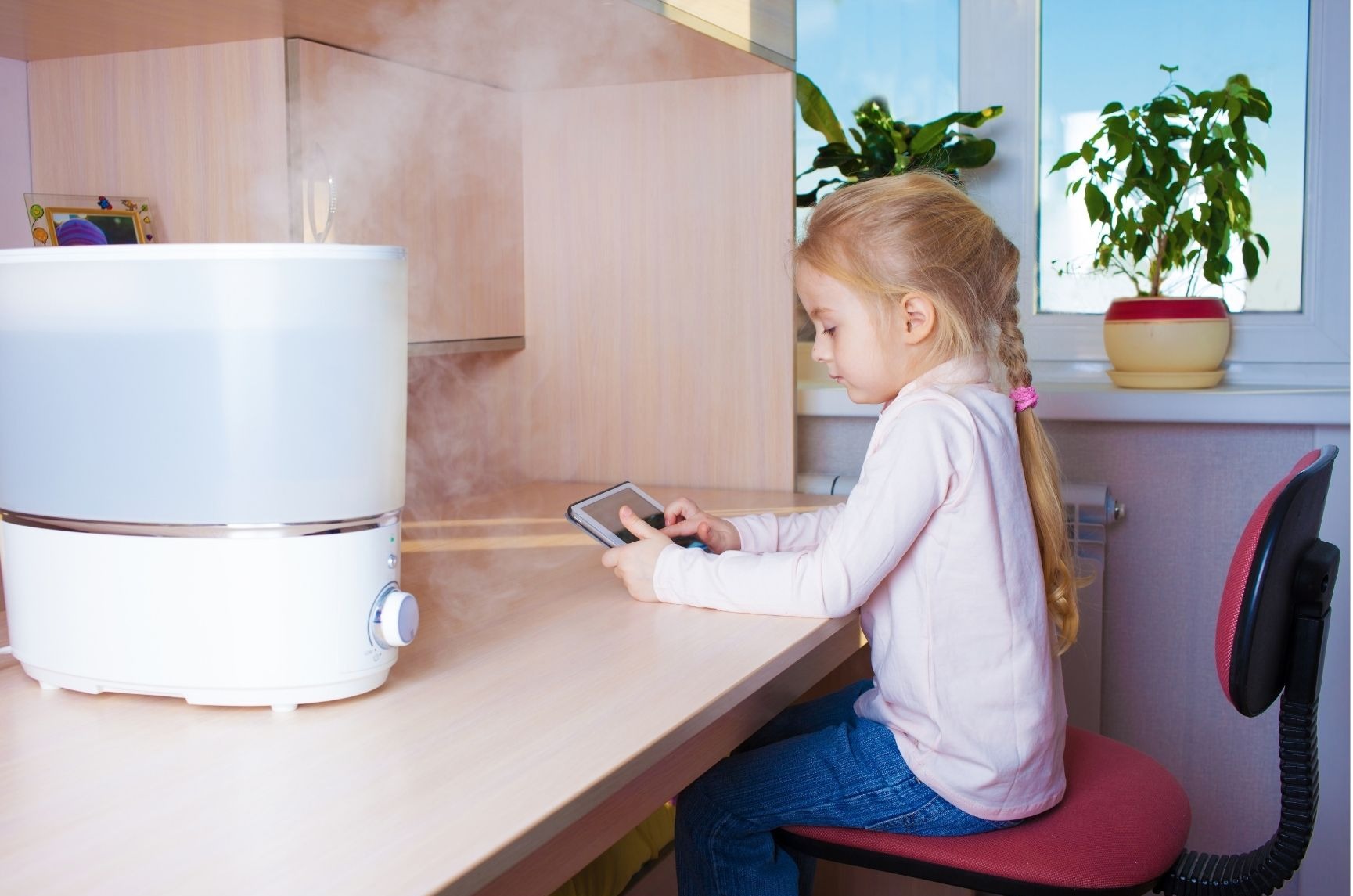Mold is a very destructive agent, not only to your home and property but also to your health. Mold growth can also be very consuming when it is left unchecked. And damage can occur very quickly.
Finding the source and stopping it is of the essence when you are dealing with it.
Table of Contents
Can Humidifiers Cause Mold?
“No. A well maintained humidifier that is operating in the right humidity range will not cause mold.”
But a humidifier that is not cleaned often and allowed to run with water that has been stagnated will not only accumulate mold and bacteria inside of the basin, it will dispense mold and bacteria into the air you breathe.
Poor air quality that is full of mold and bacteria can be dangerous and cause symptoms that are similar to pneumonia and the flu, etc.
However if a humidifier is being operated how it is intended to be when the humidity in the room has dropped below 40%, it will only benefit you.
Are there any special circumstances where a humidifier could cause mold to grow?
Yes. For instance, you were running a humidifier when the humidity is well above the need for the humidifier to be running.
If you already have 80% humidity and you’re doing something to add more humidity, like run a humidifier, then you’re going to have condensation, which given the right circumstances can begin to grow mold.
Another scenario is that you have a humidifier that has a physical leak and is allowed to drip onto the wall or behind a desk or other furniture.
Anywhere you have a leak in your house, regardless of the source, you have a good chance of finding mold.
Can a Humidifier Prevent Mold?
Yes.
And yes you read that right. Studies have shown that excessively dry air creates a much easier path for allergens like mold spores, pollen, airborne bacteria and viruses, to be able to travel much further.
The idea is that when the humidity of the air in your home, business, School, etc. Is kept between 40 and 60%, the moisture in the air does not allow for these “airborne health threats” to travel nearly as far before they are forced to the surface by the weight of the humidity drops.
The right moisture level in the air will actually keep mold spores from being able to travel as far as they would be able to in dry air. And keep it out of the ambient air that you are breathing in.
Maintaining the optimal humidity in your home has so many benefits that it outweighs any of the potential negatives by a mile.
Benefits of a humidifier:
1. Alleviate dry skin
2. Stop nosebleeds
3. Help control acne
4. Keep viruses at Bay
5. Control static shock
6. Help control dust
7. Helps immunity
8. Help control allergies
9. Increase oxygen
1. Alleviate dry skin
Dry skin is a universal problem that we all deal with from time to time. And it is a problem that is in direct correlation to the amount of moisture in our airstream.
Simply put; if the air is dry then your skin does not have the available moisture to be able to absorb. And to make matters worse, dry air means extra dust in the air, which pulls moisture out of your skin.
A humidifier is the perfect tool to add moisture back to a home that is suffering with low humidity.
2. Nosebleeds
Nosebleeds and congestion are the main telltale signs that it is time to pull out the humidifier for the season.
Whenever the air gets excessively dry because of the low humidity content in the air combined with the heater blasting, dry nasal passages become intolerable.
Humidifiers are one of the best things you can do when you are suffering from nosebleeds and dry nasal passages with congestion.
3. Help control acne
Acne is not something most people associate with low humidity. But according to Hadley King MD” dry conditions expose deeper layers of skin to the outside world”. Increasing the level of moisture in your room can help maintain the level of hydration needed to keep dry cracking skin from allowing acne to get a deeper root.
4. Keep viruses away
Where the air is excessively dry, there is a wide open pallet for particles including viruses, germs and bacteria, to be able to float in the ambient air and much further than when air is properly hydrated.
Humidifiers will add moisture back to the air which can keep viruses from being able to travel as long and as far as they can in dry air.
 5. Control static shock/electricity
5. Control static shock/electricity
Static electricity is another one of those telltale signs that the humidity is low.
Without the proper humidity in the air, electrons have a lot less resistance and jump from one body to the next very easily.
Adding moisture to the air with the humidifier will cut down on the amount of static electricity that you are experiencing in your house.
6. Helps control dust
When there is a lack of humidity, dust does not have anything to keep it from floating and moving throughout the air settling on your skin and into your lungs.
Providing humidity back into the air with a humidifier will create moisture in the air that will bind with airborne dust and cause it to settle.
7. Helps immunity
A study published by medical news today states that the hair-like organelles outside of the cells that line the body’s airways, called cilia, do not function as well and dry conditions – they cannot expel viral particles as well as they otherwise would.
It’s Amazing how a humidifier can actually help your body resist viral particles much better when the air is too dry.
8. Help control allergies
Airborne allergies like pollen and mold spores that do not have any moisture in the air to keep them from floating will eventually make it into your airways and cause you to have a whole host of allergic symptoms.
Restoring the humidity in a room with a humidifier will help keep allergens from being able to float nearly as long and far as they are able to and dry air. Which can mean big relief for allergy sufferers.
9. Increase oxygen
Increasing the humidity with a humidifier when the air is dry can indirectly increase your oxygen intake.
“a humidifier is not an oxygen concentrator and it should not be mistaken for one or substituted for one”
The humidity droplets created by humidifiers can weigh down airborne allergens and dust by weighing them down and decreasing their ability to float in the ambient (air that you breathe)airstream.
Thus allowing for better oxygen intake.
Secondly, humidity combined with oxygen producing plants such as rubber plant, aloe vera, and mother-in-law’s tongue can create an oxygen-rich environment. Amazing.
Summary
Can a humidifier cause mold?
A humidifier used correctly at the right time will not cause mold.
Humidifiers are made to add moisture back to the room when the air is excessively dry and under the 40% relative humidity mark.
But a humidifier that is not used correctly or is allowed to be operated when it is unmaintained or has standing water in it, well more than likely has mold and bacteria growing in it and can create an air quality problem that can be very serious.
Other times that humidifiers could be responsible for mold is if they are run when the humidity is already high and does not constitute the use of a humidifier.
And secondly, if there is a physical problem with the humidifier and it is allowed to leak onto the furniture or floor.










